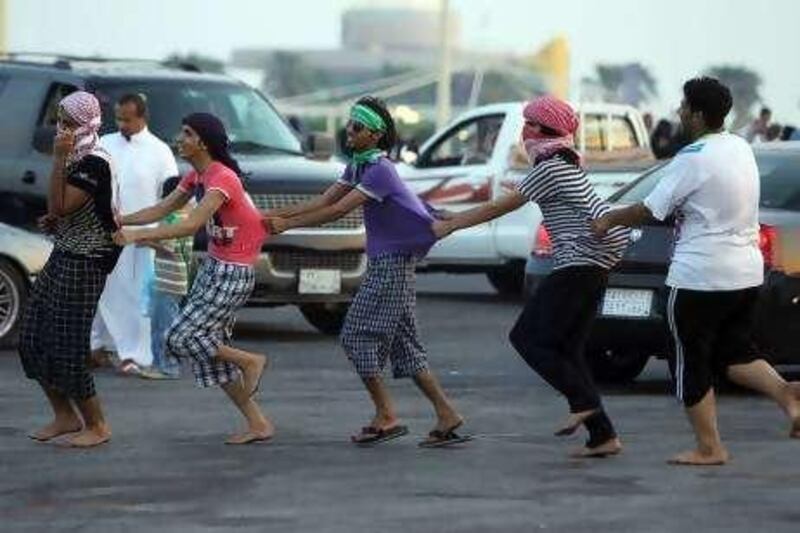RIYADH // Waving green flags embossed with Islam's profession of faith, Saudis turned out in huge crowds to celebrate their country's modern founding, illustrating the growing popularity of patriotic demonstrations on their country's National Day. Major urban arteries across the country were gridlocked as young men, their car radios blaring traditional music, held aloft the Saudi flag and shouted endearments to their nation and its leaders. Men danced in the streets as traffic ground to a halt during the Thursday night celebrations. "I love this country, what can I say?" said high school student Mohammed al Homaidhi, who was walking along Riyadh's prime boulevard of Thalia Street with his cousins and friends, several of them in green T-shirts. Families flocked to museums, exhibition halls and parks where local governments, to a greater extent than ever before, had organised theatrical presentations of the kingdom's history, performances of the all-male Saudi sword dance known as ardah, and displays of traditional crafts.
Along the Eastern Province's Corniche between Dammam and Al Khobar, Saudi crowds cheered and clapped as more than 1,000 cars, buses and motorcycles made up a flag-waving parade, according to Arab News. This growing public exuberance on Saudi National Day underscores important changes in Saudi society, most importantly Saudi nationalism's new found attraction to the country's huge youth population, as well as the diminishing influence of the religious establishment. For decades, no public events marked Saudi National Day, which commemorates the 1932 unification of the current kingdom by its founder, King Abdul Aziz Al Saud. This year is the 80th anniversary of that event according to the Islamic calendar. The absence of public celebrations stemmed from the clerics' view that publicly observing any holiday other than the two religious festivals of Eid al Fitr and Eid al Adha was an affront to Islam.
But after al Qa'eda's terrorist attacks on the kingdom in 2003 and 2004, the government began to see a need to encourage patriotic sentiments, according to Abdulmouhsen al Madani, a 30-something strategic planner in a major advertising firm in Riyadh. "The government introduced a subject in schools about watania, or patriotism," Mr al Madani said. "They were trying to build patriotism." When King Abdullah bin Abdul Aziz came to power in 2005, one of his first decrees made National Day an official holiday, signalling that he wanted it openly observed by authorities. In the five years since, official celebrations have become increasingly more organised and abundant, with a similar bounce in the private sector. For example, a new video featuring the Jeddah-based rapper Amarap Ammar and entitled May We Never Be Divided was released in time for this year's National Day. The video, posted on YouTube, celebrates national unity.
"Eighty years ago, when the kingdom was first established, it could be said that the religious establishment represented in its worldview [the] whole or most of society," said Khalid al Dakhil, a Riyadh-based political writer and sociologist. "Now, they can't claim that because ... the structure of society has changed dramatically. And you have a king who's in tune with those changes. He believes in the concept of the nation. He believes in reform. And he is not allowing the religious establishment to dictate everything." Still, added Mr al Dakhil, King Abdullah "always speaks about the twins: religion and the nation. He will never speak about one without the other and they are always in this order." Indeed, although religious conservatives may regard Saudi National Day as an unhealthy secular festival, most Saudis see no conflict between it and their faith. After all, the flag they furiously waved on Thursday night bore these words: "There is no God but God and Mohammed is his Prophet."
Like many other Saudis, the orthopaedic surgeon Samir al Sayegh, 32, said he believed that King Abdullah's promotion of National Day stems in part from an effort to dilute Saudi society's deep tribal attachments, which hinder formation of a national identity. "This is right because we should be all together as Saudis, not as individual families or tribes," said Mr al Sayegh, who was strolling around Riyadh's Sahara Mall with his wife and four children. Mr al Madani said that research he has done for his firm shows that most Saudis are patriotic and proud of their nation, but do not put country at the top of their loyalties. "First comes family, then tribe, then religion and then, believe it or not, soccer," Mr al Madani noted. Loyalty to country comes after these, he said. More than in the past, this year's National Day took place amid public expressions of dissatisfaction with the government, some Saudis noted - a result of King Abdullah's tolerance for more openness in the local press, as well as the freedom of speech enabled by the internet. For example, internet forums have carried criticism of the US$60 billion (Dh220bn) arms package that the kingdom is about to purchase from the United States, according to US media reports, as people question why the money is not used instead to upgrade health care, education and urban infrastructure. The gist of the remarks, Mr al Madani said, is that "instead of spending $60 billion on inferior weapons, let's make sure Jeddah doesn't drown again." More than 120 people died in Jeddah's floods last November. Norah al Saja, 26, who has a master's degree in public health, said she is happy to see National Day as an official holiday, but her excitement is tempered by what she regards as unfinished business. "I really like King Abdullah. I think he's doing a good job," she said. "Definitely they are taking steps in the right direction. I just wish it would be more." cmurphy@thenational.ae





